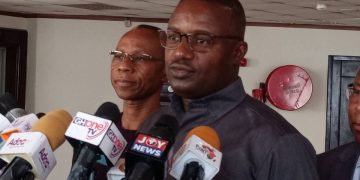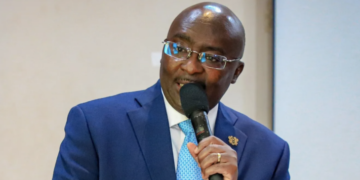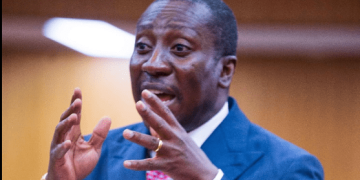Dr Bryan Acheampong, a former Minister of State in charge of National Security, has said It is uncertain that the Struggling African economies will improve until peace is restored to every region of the continent.
According to him, peacebuilding is essential in Africa since it is necessary in practically all of the continent’s states to bring about lasting peace and general progress.
Speaking at the at the 12th Joint Graduation ceremony of the Kofi Annan International Peacekeeping Training Centre (KAIPTC) in Accra, Dr Bryan Acheampong, the Minister of Food and Agriculture, explained that investing in peacebuilding research, institutional development, and capacity building through such partnerships would also contribute to addressing African challenges by African scholars as well as global challenges from an African perspective.
“Funding for peacebuilding research remains largely controlled by a few international actors mostly in the Global North.
Dr Bryan Acheampong further stated, “Peacebuilding is a collective responsibility of state and non-state actors” and that African governments and the private sector must consider investing in peacebuilding research, institutional development, and capacity building.
The joint graduation ceremony, on the theme: “Educating the Next Generation of Peacebuilders in Africa”, was chaired by Prof Samuel Kwaku Bonsu, the Rector of the Ghana Institute of Management and Public Administration (GIMPA).
Some 37 post-graduate students were awarded various degrees in Master of Arts in Gender, Peace, and Security (MGPS), Master of Arts in Conflict, Peace and Security (MCPS), Executive Master of Arts in Conflict, Peace and Security (EMCPS), Weekend Master of Arts in Conflict, Peace and Security (WMCPS), Weekend Master of Arts in Gender, Peace and Security (WMGPS).
Dr Acheampong said since 2020, the region had seen about six successful coups with multiple coup attempts, the latest being in Sierra Leone.
He intimated that the relapse to militarism and the popular domestic support that characterized them raised fundamental questions about the brand of democracy and constitutionalism being practiced on the continent, and the effectiveness of regional norms and principles as mechanisms for democratic consolidation in West Africa.
Dr Acheampong said over the last two decades, the nature of conflicts had changed, necessitating African states, the United Nations Peacekeeping Operations, Africa Union Peace Support Operations, and Regional Economic Communities/Regional Mechanisms to adapt.
Across Sub-Saharan Africa, countries were developing security and military capacities to deal with emerging and existing threats, the Minister noted.
According to the Minister, who has served in the United States Air Force with Security and Intelligence training, emerging peacebuilding approaches emphasized localization necessitating that peacebuilding academia embraced new partnerships which enforced Global South cooperation in developing African research agendas.
That, he stated, could contribute to addressing African challenges by African scholars as well as global challenges from an African perspective.
Major General Richard Addo Gyane, Commandant, KAIPTC, charged the graduates to apply the intuitive and analytical skills they had gleaned from KAIPTC to guide discussions on best practices and attitudes in dealing with social issues.
“Be critical thinkers who are not easily cowed into replacing right with wrong but insist on transparency and fair play with a huge dose of integrity,” he said.



















































































